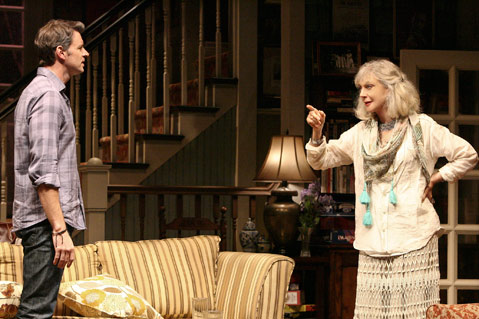Review: The Country House
Donald Margulies Has a New Play at the Geffen

The Country House paints a gently potent, subtly perverse picture of a talented theater family for whom all the world is a stage, but the seething wit that pours from their mouths in this exciting play shows them to be much more than mere players. The story revolves around how the great actress Anna Patterson (Blythe Danner) and her kin grapple with returning to the Williamstown Theater Festival for summer stock in the aftermath of the death of Anna’s beloved daughter Kathy at 41 from cancer. A contemporary American comedy that harks back to the classic work of Anton Chekhov in The Cherry Orchard and The Seagull, this ode to seasonal and filial antics gone awry is a great example of what the Geffen does best: compelling, high-quality new plays that are tuned perfectly to our present cultural moment.
Playwright Donald Margulies has a knack for revealing the unspoken. Daniel Sullivan’s direction brings the dynamics between the talented and talentless, of love and abstraction, and of the generational shifts that tie a family together — and pull it apart — to subtle and electric life. Like Sam Shepard and Tracy Letts, Margulies has an eye for family dysfunction, but he also possesses the fortitude to create a modern-day kitchen-sink masterpiece of naturalism with true Chekhovian cleverness. Augmented by a spot-on cast, this play is a definite must-see.
In the quiet opening scene, the youngest character, Susie (played by the superb Sarah Steele) enters alone to find — and secretly use — an old lipstick she’s retrieved from the couch. It introduces a pervasive sense of loss and a feeling of desire that never leaves the show’s one-room set. Sullivan deftly captures the sense that someone is missing who can never be replaced.
As we are transported by a simple but fully realized set design to The Country House, the rest of the incredible cast emerges. The show features Scott Foley as Michael, the subversive celebrity stud; Eric Lange as Elliot, the whiny, yearning, and oedipally plagued son; and David Rasche as Walter, the aging in-law/brilliant director. The cast is topped off with the addition of Emily Swallow as Nell, the sexy young girlfriend of Walter and an old flame of Elliot’s. Trouble ensues. The actors capture deftly the feel of competition, the ethereal draw of talent, the ruthless pain of pleasure-seeking, and the comprehensive break from the real world where hell is unleashed amid a summer vacation home. Danner’s performance as Anna, however, takes the cake. Anna instigates the most gratifyingly transcendent moment of the play, and Danner, refusing to indulge in the least, graces the stage with seeming effortlessness.
One of the pivotal functions and guilty pleasures of The Country House lies in how Margulies deploys witty references to his and our own Southern California. Quips about L.A. lifestyle choices — vegetarians, people allergic to gluten, young women with older men, and the cult of celebrity — all reflect an attitude that is less a matter of acceptance and more one of ridicule for the sheer indulgence of it all. Margulies captures the angst of the artist, whose life is so fraught with facades at every point on the spectrum from the “sell out” to the “unsellable.”
The play also gratifyingly makes fun of itself. Walter voices his newfound disdain for theater as an art form where people “pretend there is a wall.” Yet Margulies, who is among theater’s new masters, poses a formidable challenge to those who have proclaimed the art form dead. With a knack for precision in depicting emotional and intellectual ambiguities, Margulies leaves his audiences feeling ripe with wisdom. His untethered finales beg for the audience to cathartically suffer and soar with his intelligently alive characters. He also denies us, along with his fictional family, the comfort of true closure. Once Margulies’s characters come to life he leaves them on the stage bare in what seems to be a never-ending story — an immortal family tree. We leave with the gift of viewing filial connection not as blood, commodity, or comfort but as a true, not always pretty, necessity. Rather than leaving us longing for the past as in Chekhov, or looking to the potential of the future, as in Ibsen, Margulies keeps us longing for connection to the present moment, and it is this sense of fulfillment that keeps the art of the stage alive and thriving at the Geffen Playhouse.



